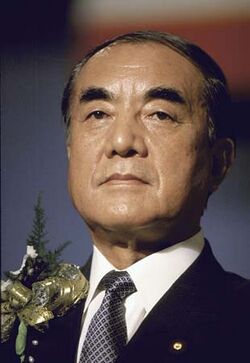Kiyosi Haruna
Prime Minister of Senria Kiyosi Haruna 하루나끼요씨 | |
|---|---|
 | |
| In office December 12, 1983 – December 8, 2003 | |
| Deputy | Takeo Miyazawa Hideki Kitayama Kumiko Yosida |
| Preceded by | Kitirou Imahara |
| Succeeded by | Sigesato Izumi |
| In office October 26, 1979 – December 12, 1983 | |
| Prime Minister | Kitirou Imahara |
| Preceded by | name |
| Succeeded by | name |
| Personal details | |
| Born | April 7, 1915 |
| Died | July 27, 2009 (91 years) |
| Nationality | Senrian |
| Political party | |
| Spouse | Aiko Ouhasi |
| Children | Hiroyosi Haruna |
| Alma mater | Tokiyori National Military Academy |
| Profession | Soldier, politician |
| Military service | |
| Allegiance | |
| Branch/service | |
| Rank | Lieutenant colonel |
| Battles/wars | Senrian-Xiaodongese War |
Kiyosi Haruna (Senrian: 하루나끼요씨, Haruna Kiyosi; April 7, 1915 - July 27, 2009) was a Senrian politician who served as the sixth Prime Minister of Senria between 1983 and 2003. Born into a burakumin family in Tukayama, Haruna decided to join the Senrian Republican Army as an enlisted soldier during the Senrian-Xiaodongese War; Haruna had become a non-commissioned officer by the end of the war, and earned decorations for meritorious conduct while fighting against Xiaodongese occupation forces in Kitasuu. Haruna participated in the liberation of the Kitaoutouri, Senseki, Matumori, Sagae, and Rokkaso extermination zones.
After the war, Haruna decided to remain within the military, graduating from Tokiyori National Military Academy and reaching the rank of lieutenant colonel. He remained in the military until 1948, when he joined the People's Party. He was elected to the National Assembly of Senria as a representative for Tukayama Prefecture in 1948. Haruna was briefly named Deputy Minister of Finance by Prime Minister Tokiyasu Kitamura, as part of a push by Kitamura to increase the power of the People's Party in relation to the Senrian Republican Armed Forces; after the assassination of Prime Minister Kitamura by Xiaodong and his replacement by military leader Takesi Takahata, Haruna was replaced. He continued to serve as a deputy and was eventually named Minister of the Interior by Kitirou Imahara in 1979.
After Imahara declined to seek reelection in 1983, Haruna became Prime Minister of Senria. Haruna was tasked with restoring the Senrian economy, which had nearly imploded due to a vast oversupply of products. Shortly after becoming Prime Minister, Haruna forced the leadership of Senria's keiretu to agree on a division of the economy, with certain keiretu handling certain sectors, in order to end the oversupply crisis. Haruna also lessened the restrictions on political liberties established by Takahata and Imahara, allowing opposition parties increased freedom to operate without government harassment. Haruna has also been credited with restoring press freedom in Senria, which had been heavily restricted under his predecessors. However, some have alleged that Haruna attempted to offset the effects of these reforms by making deals with major newspapers and television news channels in exchange for favorable coverage of the People's Party and Senrian government.
Within the realm of foreign affairs, Haruna was perceived as a hardliner in many areas. Haruna took a particularly hard line on the issue of relations with Xiaodong, increasing the size of Senria's navy to "guarantee its capacity to handle the Xiaodongese threat", extensively lobbying for a boycott of Xiaodongese goods, demanding the recognition of the Senrian Genocide by foreign governments and international organizations, and- most infamously- approving the assassination of Xiaodongese First Minister Sun Yuting in 1984. In spite of this, however, Haruna also oversaw the reestablishment of formal diplomatic relations between the two countries in 1988. Haruna also sought to further expand Senria's prominence as a leading industrial, commercial, and cultural power, and oversaw the country's response to the 1995 Kinkeidou Earthquake, for which he was widely praised.
Haruna surpassed Takesi Takahata as the longest-serving Prime Minister of Senria on October 6, 1999. He declined to seek reelection to the prime ministership in 2003, and was replaced with Sigesato Izumi. He died in 2009 after suffering a ischemic stroke. Within Senria, Haruna is widely praised and respected for his leadership during the economic crisis of the early 1980s, for the hard line he took on relations with Xiaodong, and for his decision to loosen restrictions on freedom of speech and of the press. Some, however, have criticized him for his perceived closeness to the leadership of the keiretu and have accused him of "paying off" media sources with tax breaks and gifts to guarantee favorable coverage of the People's Party in Senrian media.